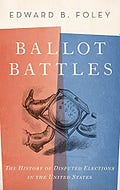This week I continued my series on the Restoring the Guardrails of Democracy with Ned Foley – Ebersold Chair in Constitutional Law at The Ohio State University – and the representative of Team Progressive.
See Part 1 of the series here, with Ilya Somin:
In Part 2, we try to make sense of the word “guardrails” in the context of the events following the 2020 election.
What should we make of the fact that a candidate refused to accept defeat, and got several sitting Senators – and countless House members – to go along with his plan to overturn the results of the election?
Is that a problem with Trump, or with our democracy?
Foley says it’s a problem with the system:
“In my judgment, we kind of have a problem or a pathology in our system analogous to the McCarthy-era Red Scare.”
He references Richard Hofstadter’s famous essay on the Paranoid Style in American Politics to warn of the dangers of a charismatic demagogue (like Trump or McCarthy) when combined with an enthusiastic party base that is willing to ignore reality in their crusade against a scapegoat – whether that’s communists in the State Department, or traitors in the “Deep State.”
The question before us is how to increase Americans’ confidence in election results regardless of who wins. How can we get the overwhelming majority to trust the process, even if they don’t like the end result?
Here, Foley cites the Madisonian concept of factions – where ambitions counteract ambitions. A republic, in Madison’s view, shouldn’t require superhuman virtue. After all, men are not angels:
“We have to take human nature as it is and create institutions that will somehow achieve, as closely as possible, the collective public interest – given the natural self interest of each one of us.”
He suggests improving the vote-counting process itself with better chain of custody rules. Even if rumors of voter fraud were exaggerated, the mere perception can be equally dangerous.
Beyond that, Foley wishes to see alternative methods of aggregating disparate voter preferences, besides a simple winner-of-the-most votes.
He explains how ranked-choice voting could make election results reflect the popular will more closely, while also allowing greater diversity than the two parties offer.
These reforms may seem farfetched, but other ideas like getting rid of gerrymandering have widespread support among the population. It’s just parties – always looking to tighten their hold on power – that support drawing districts in a way that guarantees incumbent victories. When 96% of seats in Congress are considered “safe,” something has gone terribly wrong in our democracy. Foley proposes allowing citizens to identify what “district” they want to vote in, within their state, according to criteria other than narrow geography. If a particular criterion obtains a sufficient number of registered voters, it becomes designated as a district. This has a historical basis in states like New Jersey, which used to elect all of their national representatives in a statewide election.
The ultimate reform to the electoral system would be a switch from the electoral college to a popular vote. This would require a Constitutional Amendment, and Foley admits that this is unlikely to happen anytime soon. However, he adds the caveat that a national popular vote should require one candidate to win at least 50% of the vote. If three candidates split the vote such that no one reaches that mark (as happened when Bill Clinton won with 44% of the vote in 1992), then there should be a run-off between the top two vote-getters, in Foley’s view.
Lastly, no conversation about the guardrails of democracy would be complete without some talk of “misinformation.” How should it be treated? Should it be criminally prosecuted? And who decides what counts as misinformation?
Regarding laws that would make speech containing misinformation illegal, Foley says, “there [would have] to be proof, not just that [a statement] was false, but that it was motivated for electoral purposes, with evidence of that.”
Like all good guardrails, we hopefully wouldn’t need to use it, but it could make politicians think twice and self-censor to avoid dealing in blatant dishonesty.
We also discussed the role of social media companies like Twitter in regulating misinformation on their platforms, but you’ll have to listen to the end to find out what we said.
















Enhancing Trust in Democracy